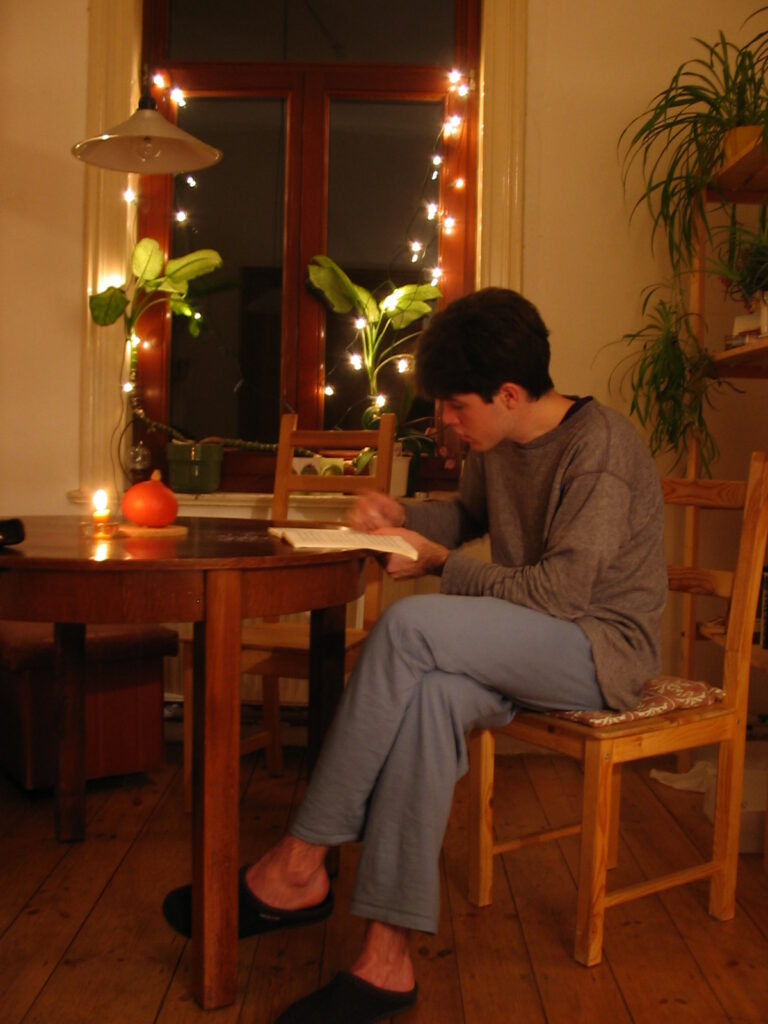Bruce Duncan
Nothing I can say seems adequate to describe the sense of loss I feel. Perhaps the following recommendation that I once wrote will help to describe some of Christopher’s unique qualities:
Recommendation for Christopher McMullen-Laird
28 June 2007
Christopher McMullen-Laird is a force of nature. I can only hope that this sincere recommendation does not strike the selection committee as hyperbolical. Zeke, as he is known to everyone, thoroughly enriched the intellectual lives of students and faculty during his time at Dartmouth College, and he continues to do so even two years after his graduation. He combines intelligence, talent, imagination, energy, linguistic sophistication — and charm — to a degree that I find unique in my 38 years of college teaching, and I endorse his application for a Fulbright Fellowship with enthusiasm. Zeke has already received considerable post-graduate support for his undertakings, but I believe strongly that a Fulbright award would be a case of throwing good money after good.
I have known Zeke in a variety of capacities. Being wholly bilingual, he was immediately hired as a freshman to work as a teaching assistant in the German Department. Our so-called drill instructors supplement the regular elementary language instruction by conducting oral drills with a group of seven or eight students for four hours a week. The position calls not only for proficiency in German, but also for enthusiasm, reliability, energy, humor, empathy, and the pedagogical flair to project these qualities. It is no easy matter to gain the full cooperation of a group of sleepy students at eight o’clock in the morning, and it is not enough to entertain them; they must feel that their time is being well spent. Zeke’s success in this position was nothing short of spectacular.
In his junior year he chose to take advantage of our German exchange program, which is coordinated on the German end by the Federation of German-American Clubs. Studying at the University of Mainz because of the conducting possibilities that its conservatory offers, he made such an impression that we still regularly receive letters from the Federation singing his praises.
Zeke then spent his final year at Dartmouth as a Senior Fellow. As the official description of this program says, “The [not more than ten] Senior Fellows are chosen from among students of such intellectual caliber, independence of character, and imaginative curiosity that they have become interested in some personal project of study that will contribute to their own intellectual growth. Every Senior Fellowship must involve a project in which the intellectual scope and breadth of imagination goes beyond that which can be accomplished by taking courses offered in the existing curriculum.” Zeke did just that, with a study of Mozart’s last year. His project included not only a series of lectures (I particularly remember one on the importance of Freemasonry for Mozart’s music), but also a full concert of works from 1791\. Zeke conducted, among other pieces, the Requiem and the Overture to the Magic Flute. Perhaps even more impressive: he assembled — and found the funds for — the professional orchestra, chorus, and soloists. The result was remarkable.
Another example of Zeke’s qualities: when Steven Scher, a distinguished colleague who had taught German literature at Dartmouth for over 30 years, died suddenly, his widow asked Zeke to be one of the speakers at the memorial service in the spring of 2005\. Even when compared to the contributions of senior scholars from all over, his eloquent, thoughtful, and heart-felt talk stood out. Any number of attendees from other institutions asked, “Do you really have students like that at Dartmouth?” I had to admit that they are rare.
Since his graduation from Dartmouth in 2005, Zeke has not slowed down a bit. I have met with him several times in Germany and continue to be impressed with his accomplishments. In addition to amassing further conducting experience, he has become a real contributor to Early Music studies. There is no doubt in my mind that he will make optimal use of fellowship support and also be a credit to the Fulbright program.
Bruce Duncan
Prof. of German Studies

